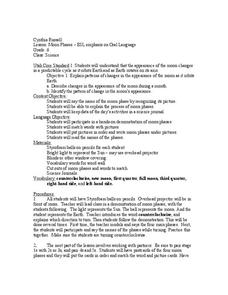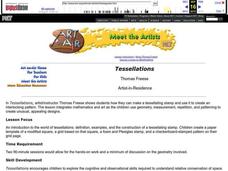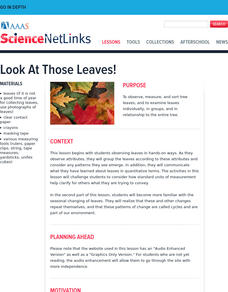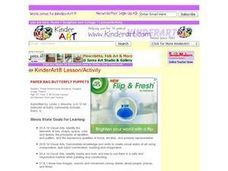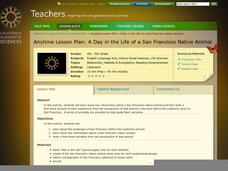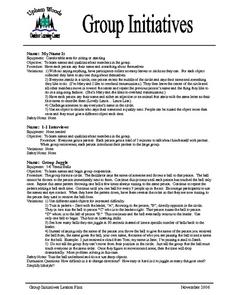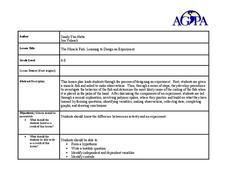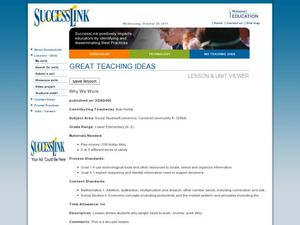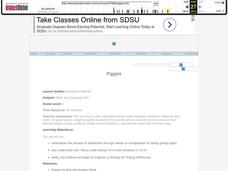Curated OER
Moon Phases
Sixth graders investigate the phases of the moon. In this moon phase activity, 6th graders discover that the moon changes in a cycle as it orbits Earth. Students label pictures of moon phases and keep a moon phase journal. Students...
Curated OER
Tessellations
Students learn and review basic geometric terms, definitions, and theory, including regular polygons, lines, angles, points, etc. They make a tessellating stamp and create a repeating work of art.
Curated OER
Look At Those Leaves!
Students observe, measure, and sort tree leaves. They examine leaves individually, in groups, and in relationship to the entire tree. They become familiar with the seasonal changing of leaves. They realize that these and other changes...
Curated OER
Polygons, Parallelograms, Quadrilaterals- Oh My!!!
Students demonstrate their comprehension of shapes and their properties. They work in small groups. Students review the following terms: property, polygon, quadrilateral, and parallelogram. They read Shape Up! Fun With Triangles and...
Curated OER
Watch Me Grow
Students observe that plants need air, food, light, and water to survive. In this plant biology lesson, students observe the growth and development of two plants, one is the control plant and the other is denied either air, water,...
Curated OER
Value Your Digits
Third graders work with place value. In this place value lesson, 3rd graders write three digit numbers and tell the place value of each number. They compare numbers and money, regroup, discuss the value of coins, and count money.
Curated OER
Using Excel To Teach Probability And Graphing
Students engage in the use of technology to investigate the mathematical concepts of probability and graphing. They use the skills of predicting an outcome to come up with reasonable possibilities. Students also practice using a...
Cornell University
Forensic Science: Case of the Missing Diamond Maker
Someone stole a diamond-making machine. Who done it? Scholars use forensic science at six different stations to determine the culprit. They analyze fingerprints, use their senses, and complete chemistry experiments to determine the...
Curated OER
Paper Bag Butterfly Puppets
Whether you're using it to tell stories, explore the letter b, or during a life science activity, these butterfly puppets will be a hit. Youngsters use crayons, tissue paper, and paper bags to create butterfly puppets.
California Academy of Science
A Day inthe Life of a San Francisco Native Animal
Although the lesson is specifically about the San Francisco Bay area, it's good enough to be adapted to any local region. Children research what the landscape in San Francisco was like prior to settlement, they consider the types of...
It's About Time
Slinkies and Waves
Slinkies® are a great tool for visualizing waves. Pupils work in groups to create both transverse and longitudinal waves before using a polarizer to analyze the ways they are able to travel.
It's About Time
How Do Carbon Dioxide Concentrations in the Atmosphere Affect Global Climate?
Does carbon dioxide really affect temperatures across the world? This fifth installment in a six-part series investigates the relationship between carbon dioxide and global temperatures. Graphs created from genuine data help...
Curated OER
Water Cycle
Identify and interpret the earth's different water sources. Third and fourth graders describe and demonstrate the process of the water cycle, make a model of its two main parts, and predict and infer to answer questions about the...
Curated OER
Soft Sculpture Birds
Art can mimic life, and animals are always interesting subjects. Learners create large soft sculptures (stuffed) birds using paper, paint, and other basic collage materials. They view images of birds, and discuss bird traits and shapes....
Curated OER
Thar She Blows!
Students identify the advantages and disadvantages of wind farms and turbines. They examine how weather conditions can affect their effectiveness and how engineers are trying to solve the problem. They discover how engineers use this...
Curated OER
Give Me Five, Cents That Is
Students explore coins, especially the nickel, through a toy cash register, worksheet, and paper nickels.
Curated OER
The Water Cycle
Learners study the water cycle. In this water cycle activity, students examine how the water cycle works, what its functions are, and how to diagram it.
Curated OER
Group Initiatives
Students explore the names and qualities about members in the group. They each say their name and something about themselves. Students gather around in a circle. They listen to the teacher as he or she says the name of someone and throws...
Curated OER
The Miracle Fish: Learning to Design an Experiment
Students develop procedures to explore the behavior of fish. In this scientific experiment lesson students from a hypothesis, write a question, identify different variables and controls in their experiment.
Curated OER
Electron Arrangements
Students write electron configurations and identify groups. In this investigative lesson students use valence electrons to draw electron dot structures.
Curated OER
Piggies
First graders listen to the book, Piggies, and act out the events of the story with premade puffball pigs.
Curated OER
Human Obstacle Course
Students are in a group - half of them be an obstacle and half be moving around them, and then they switch. This engaging game promotes lots of movement.


